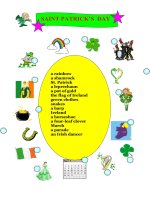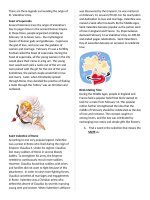10700 st georges day
Bạn đang xem bản rút gọn của tài liệu. Xem và tải ngay bản đầy đủ của tài liệu tại đây (178.75 KB, 9 trang )
SAINT GEORGE’S DAY - 23rd April
St George is the patron saint of England. He
lived in the third century, but he probably was not
English. He was a soldier and was killed on 23rd
April, 303 because he was a Christian. His tomb is
said to be in Palestine and, over the centuries, he
came to symbolise bravery and good manners.
Another word for these good qualities is chivalry.
In the Middle Ages every good soldier wanted to be chivalrous, like St George
was in earlier times. England made him its patron saint in the fourteenth century,
when bravery in war was very important.
There is a famous story about St George and a dragon who was
frightening the whole country. First of all, the people gave it two sheep a day to
eat, but then they had no more sheep. So they had to give it humans to eat and
they did this by drawing lots. This meant that everyone’s name was written
down and one was picked out every day.
One day, the king’s daughter, the princess, found out that she was to be
the dragon’s next meal. The king was very sad, but the people said that she must
go. That was when the king asked for St George’s help. The princess dressed
herself all in white and went to the dragon, but St George was right behind. He
bravely fought the dragon and took it back to show the king using the princess’
belt to pull the dragon along. He told the people not to be afraid, but to become
Christians by being baptised. This is a ceremony where water is poured on the
head and the person becomes a Christian. They agreed, so St George killed the
dragon and baptised fifteen thousand people!
The king wanted to give him money in return for saving his daughter’s
life, but St George refused. Instead, he asked the king to look after the poor, the
priests and the churches.
The red rose is the emblem of England, but not many people wear a rose
on St George’s Day. In fact, the majority of them do not even know which day
their patron saint is remembered - unlike the Welsh, the Irish and the Scots.
The 23rd April is also the birthday of William Shakespeare, England’s
greatest playwright. He lived from 1564 to 1616 and was born in Stratfordupon-Avon. He wrote at least thirty seven plays, some of which are comedies
like A Midsummer Night’s Dream, and some of which are tragedies, like Hamlet
and Macbeth. His language can be difficult to understand, even for British
people, but his plays are studied a lot in schools. They are also regularly
performed, specially at Stratford-upon-Avon.
EXERCISES.
1.- Say if the following sentences about the text are true or false:
TRUE
FALSE
a.- People gave two sheep to the dragon every week.
b.- The red rose is the emblem of the UK.
c.- St George was killed in the fourteenth century.
d.- Shakespeare wrote tragedies and comedies.
e.- St George’s Day is a very important day in
England, and people celebrate it a lot.
f.- Shakespeare’s language is difficult to understand.
g.- Everyone’s name was put on a list for the dragon.
h.- St George used the princess belt to kill the
dragon.
2.- In the text about St George, there are some irregular verbs in
simple past tense, put them in the box and then write a sentence with
each one. Some of the verbs are repeated, only use one.
a. ____________ b. ___________ c. __________ d. _____________
e. ____________ f. ___________ g. __________ h. _____________
i. ___________ j. ___________
a. _________________________________________________ .
b. _________________________________________________ .
c. _________________________________________________ .
d. _________________________________________________ .
e. _________________________________________________ .
f. _________________________________________________ .
g. _________________________________________________ .
h. _________________________________________________ .
i. __________________________________________________ .
j. __________________________________________________ .
3.- Make questions about the text for these answers using Wh-words
like when, where, who, what, how, why.:
a.- ___________________________________ ? - His tomb is said to be in
Palestine.
b.- ___________________________________ ? - The next person for the
dragon was the princess.
c.- ____________________________________? - People are baptised by
pouring water on their heads.
d.- ___________________________________? - It’s the emblem of
England.
e.- ____________________________________ ? - The king wanted to
give money to St George because he saved his daughter’s life.
4.- Match these verbs with their meaning:
- Pick out
- Find out
- Ask for
- Take back
- Pull along
- Look after
- Llevar de regreso.
- Pedir.
- Escoger.
- Llevar arrastrando.
- Descubrir.
- Cuidar.
5.- Pronunciation: In the text about St George there are 13 words that are
pronounced using the sound /ai/, and another 13 words pronounced with
the sound /ei/. Find them:
/ai/
- Palestine
-
-
/ei/
- Saint
-
-
6.- Change into negative these sentences extracted from the text:
- The king wanted to give him money.
- ___________________________________________________________
- He told the people not to be afraid.
- ___________________________________________________________
- The red rose is the emblem of England.
- ___________________________________________________________
- The people gave it two sheep a day to eat.
- ___________________________________________________________
- His language can be difficult to understand.
- ___________________________________________________________
7.- Draw a map of Britain, then mark and colour England (red), Wales
(yellow), Ireland (green) and Scotland (blue). Locate their capitals.
8.- In the text you can find many words in plural. Some of them finish
in -s, others finish in -es, others in -ies, and others don’t add anything.
Can you classify them into 4 groups?
-s
___________
___________
___________
___________
___________
___________
___________
___________
-es
_________
_________
_________
_________
_________
_________
_________
_________
-ies
_________
_________
_________
_________
_________
_________
_________
_________
nothing
__________
__________
__________
__________
__________
__________
__________
__________
Now add to the list more plural nouns to complete all the lines.
9.- The Possessive Case. As you already know, sometimes we need to
express possession using The Saxon Genitive (Possessive Case) with the
form ‘s or -s’. In the text there are 9 examples, write them down here:
a.- ___________________________________________________.
b.- ___________________________________________________.
c.- ___________________________________________________.
d.- ___________________________________________________.
e.- ___________________________________________________.
10. WILLIAM SHAKESPEARE’S BIOGRAPHY
William Shakespeare (1564 - 1616) was born in Strattford-uponAvon. There is no information about his early years. At the age of eighteen,
he married Ann Hathaway, a farmer’s daughter. There is a gap of seven
years in which nothing definite is known about Shakespeare, until he
appears as an actor -dramatist in London. His plays, ‘ Hamlet ‘, ‘
Macbeth’ , ‘ Romeo and Juliet ‘, etc. are known all over the world. He
also wrote 154 sonnets, of which, perhaps, the most famous is the one
which begins with the line ‘ Shall I compare thee to a Summer’s day ? ‘
Shakespeare is the greatest dramatist and poet of the English language.
A. Make questions for the following answers.
1. ____________________________________________________________________
Shakespeare
2. ____________________________________________________________________
Anne Hathaway
3. ____________________________________________________________________
Hamlet, Macbeth, Romeo and Juliet
4. ____________________________________________________________________
154 sonnets
B. Read Aloud
A SONNET ( XVIII ) Fragment
Shall I compare thee to a Summer’s day?
Thou art more lovely and more temperate
Rough winds do shake the darling buds of May,
And Summer’s lease hath all too short a date.
1. Think for a while.
What’s the meaning of...?
thee: _________
thou: _________
art : __________
hath : ________
TO BE OR NOT TO BE ( Fragment )
To be or not to be, that is the question:
Whether ‘t is nobler in the mind to suffer
The slings and arrows of outrageous fortune,
Or to take arms against a sea of troubles,
And by opposing end them ? To die, to sleep,
No more; and by a sleep to say we end
The heart-ache and the thousand natural shocks...
‘ Hamlet ‘ ( Act III, Scene I )
1. Complete the sentences with a word from the text.
a. The girl fell in love and said that she had a terrible __________.
b. My best friend __________ an accident last night.
c. I couldn’t __________ last night because I had too much coffee.
d. I found a deer hurt by an __________ in the forest.
e. One friend of mine is always in __________ because of his behaviour.
f. Barcelona plays __________ Español tonight.









